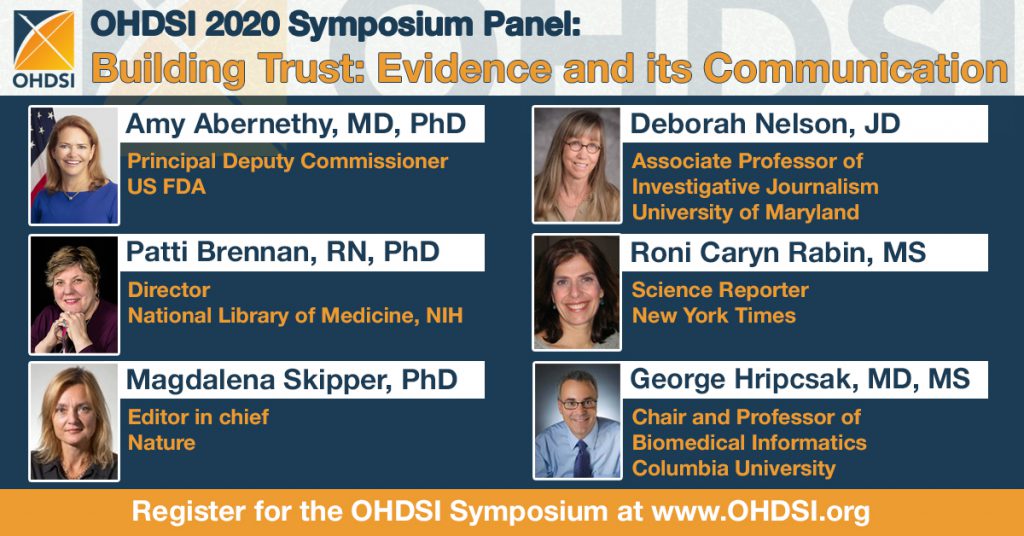Links:
Link To Watch Panel • Add to my Calendar
Leaders from around the healthcare community will share their insights during a panel discussion entitled “Building Trust: Evidence and its Communication” during a highlight event of the 2020 OHDSI Global Symposium, which will be held Oct. 19, 2020. The panel will be held at 1 pm ET during the symposium, which is free for all attendees. You can register for the Global Symposium here.
Panel
This panel is scheduled to include:
• Amy Abernethy, MD, PhD, the Principal Deputy Commissioner of the U.S. FDA
• Patti Brennan, RN, PhD, the Director of the National Library of Medicine, NIH
• Magdalena Skipper, PhD, Editor in Chief, Nature
• Deborah Nelson, JD, Associate Professor of Investigative Journalism, University of Maryland
• Roni Caryn Rabin, MS, science reporter for the New York Times
George Hripcsak, MD, MS, Professor of Biomedical Informatics at Columbia University, will serve as moderator for this panel, which will take place at 1 pm ET during the main symposium
Topic
COVID-19 was a new infection inflicting enormous suffering with no known treatment and little known about its transmission. The scientific community roared into action, quickly generating evidence from observational data and beginning numerous trials. The editorial and peer-review process was overwhelmed, and the urgent need for evidence required rapid assessment of the studies’ rigor and importance. Highly publicized retractions and corrections contributed to a general feeling that a large proportion of the published work was substandard and misleading.
The OHDSI community strives to avoid substandard work by providing a public protocol before beginning research, reporting results only from multi-institution studies, verifying results with a full set of diagnostics, executing data quality checks, reporting data provenance, etc. Such rigor takes time, however, and given the current paradigm of celebrating being “first,” there remains little opportunity to provide reliable evidence after the journals have accepted early questionable results. Such undue focus on speed gives the unfortunate impression that once sufficient unreliable evidence has been published, reliable answers are no longer needed.
Point and counterpoint 1
• The scientific community took on an unprecedented challenge and produced observational evidence at a higher-than-ever rate, and while some studies were faulty, on the whole, it produced useful information that benefited the fight against COVID-19.
vs.
• Based on the poor, misleading evidence that has been published in the past and for COVID-19, the scientific process must undergo major revision.
Point and counterpoint 2
• An enormous number of studies, including observational research and small clinical trials, were placed on archives with no review and reported on in the press; this must be better controlled.
vs.
• The archives provided a legitimate means of supplying early results, and the press well understood the limitations of the archives and generally reported the caveats.
Point and counterpoint 3
• With the emergence of large-scale techniques to generate evidence and the inability of reviewers to adequately judge studies with thousands of results, the publishing community must engage more tightly with the evidence generation community, creating new models to promote evidence generation and assess the validity of the evidence.
vs.
• The publishing community must remain distant from the evidence generation community to maintain scientific independence and avoid conflicts.
Important Links for the Symposium
Registration/Information: Tutorials (Oct. 18) • Global Symposium (Oct. 19) • Study-A-Thon (Oct. 20-21)
Global Symposium Schedule: 18-hour celebration of open science, international collaboration, and community fun that will welcome our international community to share in all aspects of our OHDSI Symposium

